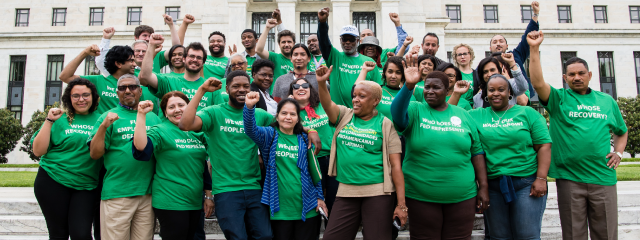CPD Network Takes Action to Pass Comprehensive Legislation to Address Opioid Epidemic

In recent years, billionaire pharmaceutical executives and hedge fund managers have made billions in profit by creating, feeding, and treating a crisis of opioid addiction in the United States.As the opioid crisis has turned into a full-blown national public health epidemic, CPD’s Opioid Network, in partnership with Hedge Clippers and P.A.I.N., traveled to Washington, DC on April 26 to take action and address the current overdose crisis.
The action convened in the Arthur M. Sackler Gallery at the Smithsonian Institute with famed photographer Nan Goldin and dozens of drug user activists from CPD affiliates including: Arkansas Community Organization, Delaware Alliance for Community Advancement, Action NC, Hoosier Action, Maryland Communities United, and Rights and Democracy VT & NH. After the action, the group held a press conference and lobby day on Capitol Hill to lift up newly introduced legislation from Senator Elizabeth Warren and Representative Elijah Cummings called the CARE Act that the CPD Opioid Network helped to create and advance.
CPD’s Opioid Network formally launched in November of 2017 and has organized our affiliates, harm reduction activists, labor organizers, academics and allies who are interested in ending the current overdose crisis. This network includes people who use drugs, people who suffer with pain, family members who have lost a loved one to overdose, medical providers, activists, and allies. The Opioid Network insists that this epidemic is a political crisis that is a direct result of our inadequate healthcare system. This crisis is further exacerbated by the longstanding policies that view substance use disorder as an issue easily addressed with law enforcement solutions. We stand firm that the provision of more and better healthcare is the only effective solution to opioid crisis.
Since its launch, the Opioid Network has continued to meet weekly and in in-person strategy sessions. The network chose to focus its advocacy on the following goals:
- As the cornerstone of substance use treatment, prevention and services, Medicaid funding must be preserved, expanded and increased.
- As the public health crisis of our time, the Opioid Epidemic requires a comprehensive public health approach that empowers the people directly impacted to make the decisions about where funding goes. Increased funding for or policies that strengthen law enforcement increase the rates of overdose and are not helpful. An important example for such comprehensive legislation that creates "planning councils" where the people directly impacted are deciding how to use the funding is the Ryan White CARE Act.
- Producers of opiates, such as Purdue Pharmaceuticals, should contribute towards the cost of this public health crisis. Congress should include a "windfall tax" on profits made by producers to help fund comprehensive legislation.
- The Opioid Network provides a place for organizations and activists to strategize and support each other to pass state and perhaps even regional campaigns for effective public health solutions such as widespread access to Naloxone, clean syringes, Medicated Assisted Treatment and safe consumption sites. These solutions should be expanded in every state.












